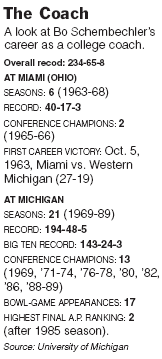Bo Schembechler, who took the University of Michigan to 13 Big Ten championships and a host of bowl appearances in becoming one of college football’s most renowned coaches, died yesterday after collapsing while preparing to tape a television show. He was 77.

Bo Schembechler, who died Friday, compiled a 194-48-5 record at Michigan from 1969-89 and was seven-time Big Ten coach of the year. More Photos »
Multimedia
Division I-A
- Scores: Top 25 | All Div. I-A
- Bowl Dates | Statistics
- Conferences and Teams
- 2006 B.C.S. Rankings
- A.P. Poll | USA Today
- Discuss College Football
Small Colleges
His death was announced by the university. The cause was congestive heart failure, said Dr. Shukri David, the chief of cardiology at Providence Hospital in Southfield, Mich., where Schembechler died, The Detroit News reported.
Schembechler had a history of heart problems. Doctors implanted a device to regulate his heartbeat after he became ill during a taping at the station, WXYZ, on Oct. 20.
Schembechler’s death came a day before the second-ranked Michigan Wolverines were to play the top-ranked Ohio State Buckeyes in Columbus, Ohio — the latest showdown in the century-old rivalry between the teams.
When Schembechler became Michigan’s coach in 1969, its glory years under Fielding Yost and Fritz Crisler were long gone. The 107,501-seat Michigan Stadium had seldom been filled in recent seasons, and the Michigan band was finding fewer occasions to hail the maize and blue with the marching song “The Victors.” The Wolverines had gone to the Rose Bowl only once in the previous 18 years.
But on Nov. 22, 1969, Schembechler put his stamp on a new day for Michigan with a 24-12 victory against top-ranked and undefeated Ohio State and Coach Woody Hayes, his former mentor.
Schembechler coached at Michigan for 21 seasons, taking his teams to 17 bowl games, including 10 Rose Bowls, with stars like quarterbacks Jim Harbaugh and Rick Leach; running backs Butch Woolfolk, Jamie Morris, Rob Lytle and Leroy Hoard; wide receiver Anthony Carter; and offensive linemen Dan Dierdorf and Reggie McKenzie.
Usually emphasizing the ground game and always preaching strong defense, Schembechler had a record of 194-48-5 at Michigan. He was the winningest football coach in team history. When he retired after the 1989 season with a record of 234-65-8 — encompassing six seasons at Miami of Ohio and the 21 years at Michigan — he had more victories than any Division I coach active at the time.
There were, however, some setbacks. Schembechler’s Michigan teams were only 2-8 in the Rose Bowl, and he never took Michigan to a national championship.
Schembechler was the epitome of blazing intensity. He paced the sideline, waving his arms and sometimes smashing headsets when he was angered by the referees. He had a heart attack hours before Michigan’s 1970 Rose Bowl game against Southern California and had bypass surgery. He had open-heart surgery again in 1987. But his combativeness rarely dimmed, and to his players he was always an imposing presence.
“It’s like this big balloon walking behind you,” Hoard, the star fullback, told The New York Times during Schembechler’s last season. “Sometimes I have this dream. You know those big balloons they have on the floats in the Thanksgiving Day parades? It’s like one of those balloons is the head of Bo and it’s following me.”
Glenn Edward Schembechler was born and reared in Barberton, Ohio, the son of a firefighter. He gained his nickname when his baby sister Marge could say only “Bobo” while trying to call him “brother.”
Schembechler was an offensive lineman at Miami of Ohio when Hayes was the coach, and he was an assistant to Hayes at Ohio State for five seasons before returning to Miami of Ohio as its head coach in 1963.
Schembechler was especially remembered for what has been called the Ten Year War — his Michigan teams’ games against Hayes and Ohio State from 1969 to 1978 in one of college football’s biggest rivalries. Schembechler’s teams were 5-4-1 in those games.
Schembechler spoke of those games in “Bo” (Warner, 1989), an autobiography written with Mitch Albom.
“It was everything I lived for,” he wrote. “Win, and you were in heaven. Buckeyes against Wolverines. Woody against me.”
But Schembechler also told of his debt to Hayes. “His temper was, at times, inexcusable,” Schembechler said in the book. “But he shaped me and everything I do with a stamp of passion and strength.”
Schembechler was also the athletic director at Michigan from July 1988 to January 1990. Just before the 1989 N.C.A.A. basketball tournament, he removed Bill Frieder as the basketball coach after learning that Frieder had agreed to become the Arizona State coach the next season. In announcing his decision, Schembechler said that “a Michigan man is going to coach Michigan” in the tournament. Steve Fisher, an assistant, guided Michigan to the N.C.A.A. championship, then was named by Schembechler as the coach.
After retiring from Michigan in 1990, Schembechler, a left-handed pitcher in college, was named the president and chief operating officer of the Detroit Tigers, a post given to him by the owner, Tom Monaghan, a longtime supporter of Michigan athletics. But Monaghan fired Schembechler in August 1992, together with Jim Campbell, the Tigers’ chairman, a week after agreeing to sell the team to Mike Ilitch.
Schembechler went on to work as a football broadcaster and an analyst for ABC Sports in 1991-92. He also gave motivational speeches and raised money for cancer research in memory of his first wife, Millie, who died of adrenal cancer in 1992. He is survived by his second wife, Cathy; a son, Glenn Edward III, known as Shemy, from his first marriage; and two stepsons, Geoffrey and Matthew. At the height of his fame, Schembechler was the state of Michigan’s pre-eminent sports figure. He also became something of a philosopher.
“Football is the American game that typifies the old American spirit,” he said. “It’s physical. It’s hard work. It’s aggressive. It’s kind of a swashbuckling American sport. Football is not going to die. It is our American heritage.”















